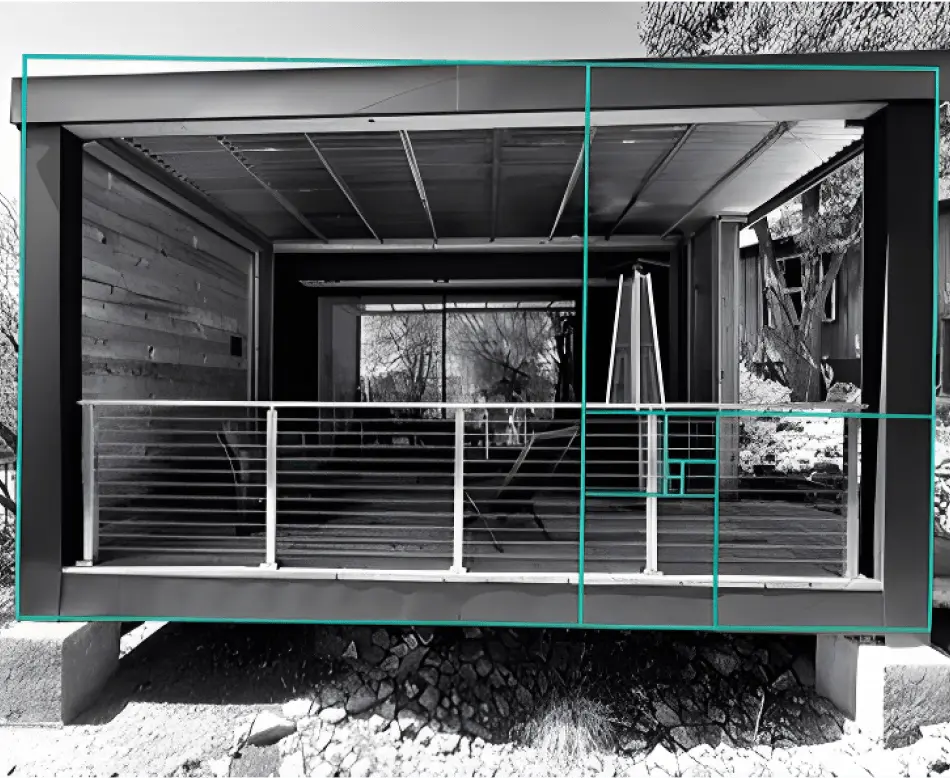Essential Form is a publication that distills years of practice, research, and field-tested application into a cohesive design philosophy. It presents not introductory speculation, but mature conclusions drawn from decades of professional experience—conclusions that speak to the enduring principles at the core of sound architecture.
At the heart of this book is a principle I consider foundational: the Golden Ratio. Known for its recurrence throughout nature, art, and classical architecture, this divine proportion—expressed through φ (phi)—has captivated human awareness for millennia. Yet I believe its significance runs deeper than historical reference or visual appeal. It resonates with us because it mirrors the very geometry of life itself.
It is my personal conviction that the Golden Ratio touches us so deeply because it is encoded in our very being. Our DNA reflects this ratio. From the spirals of shells and the growth of trees to the galaxies above and the double helix within, the Golden Ratio appears in the physical patterns of creation. When we incorporate it into architectural form, the result is not merely beautiful—it is experientially grounding. These are spaces that feel balanced, calming, and intuitively right.
Through the framework of Performance Engineering Architecture (PEA), I have worked to integrate this timeless proportional logic into contemporary design practice. This is not about reviving classical styles or clinging to aesthetic tropes. Rather, it is about aligning our buildings with the deeper rhythms of the natural world—and, in doing so, supporting the psychological well-being and spatial awareness of those who inhabit them.
Essential Form is a synthesis of these insights: a clear design philosophy forged in real-world conditions, refined through theory, and expressed with intent. It stands as a professional offering to clients, students, peers, and future practitioners who seek to build not only with precision—but with proportion, purpose, and principle.
At VQ Press, we are committed to producing works that embody this standard—design that is rooted, rigorous, and resonant.
The book blends architectural philosophy, professional insights, and practical applications into a compelling narrative. It provides a unique perspective on the principles of Performance Engineering Architecture (PEA), advocating for a holistic approach to design that harmonizes function, aesthetic, and sustainability.
The work targets an audience of architects, design professionals, and enthusiasts, presenting a strong educational component grounded in the author’s extensive expertise. At the same time, it incorporates personal anecdotes and reflections, making it accessible and engaging for readers who may not have a technical background but are interested in architecture’s transformative potential.
The themes of minimalism, sustainability, and integrity resonate strongly in today’s architectural discourse, positioning this book as both timely and significant. It could be further categorized within Professional & Technical Nonfiction or Sustainability in Design, as these focus areas reflect its educational and forward-thinking ethos.
Publisher: Pine Tree Press
Book Title: Essential Form: Insights on Function, Aesthetic, and Building Integrity
Overall Impression: We were thoroughly impressed by the depth and clarity of this manuscript. Lawrence Bowen brings a wealth of knowledge and personal insight into architecture, blending technical expertise with philosophical reflections on the role of design in society. The book’s structure, focusing on Performance Engineering Architecture (PEA), seamlessly integrates the artistic and scientific aspects of building design, making it a thought-provoking read for both professionals and enthusiasts alike.
Areas of Strength:
Innovative Approach: The PEA methodology is a game-changer in how we think about architecture. Bowen’s ability to blend engineering precision with architectural creativity is evident throughout the book. His discussions on integrating sustainability, aesthetics, and functionality showcase a forward-thinking approach to building design.
Clarity and Accessibility:
Despite the technical nature of some of the concepts, Bowen does an excellent job of making complex ideas accessible. We appreciated how he simplifies intricate engineering principles, making them understandable without sacrificing depth or accuracy.
Real-World Applications:
The case studies and examples, particularly the Citicorp Center and the application of the Golden Ratio, provide readers with practical insight into how these ideas come to life in real-world projects. These stories not only highlight the importance of technical knowledge but also demonstrate the human impact of architectural design.
Personal Touch:
Bowen’s personal anecdotes and reflections on his experiences in the field add a relatable and inspiring layer to the manuscript. His journey through the world of architecture, from childhood to his professional career, helps humanize the subject matter and makes the book feel less like a textbook and more like a conversation with a seasoned mentor.
Conclusion:
In conclusion, we think Essential Form is an exceptional piece that not only serves as a valuable guide for architects but also inspires anyone interested in the future of building design. Bowen’s perspective on Performance Engineering Architecture offers a fresh, integrated approach that challenges traditional boundaries in the field. We wholeheartedly recommend this book to those seeking a deeper understanding of architecture’s transformative potential, as it blends technical expertise with philosophical reflection in a way that is both informative and inspiring. We’re excited to see how this book will resonate with professionals in the field and hope it sparks a broader conversation about the future of sustainable and functional design. – Pine Tree Press
